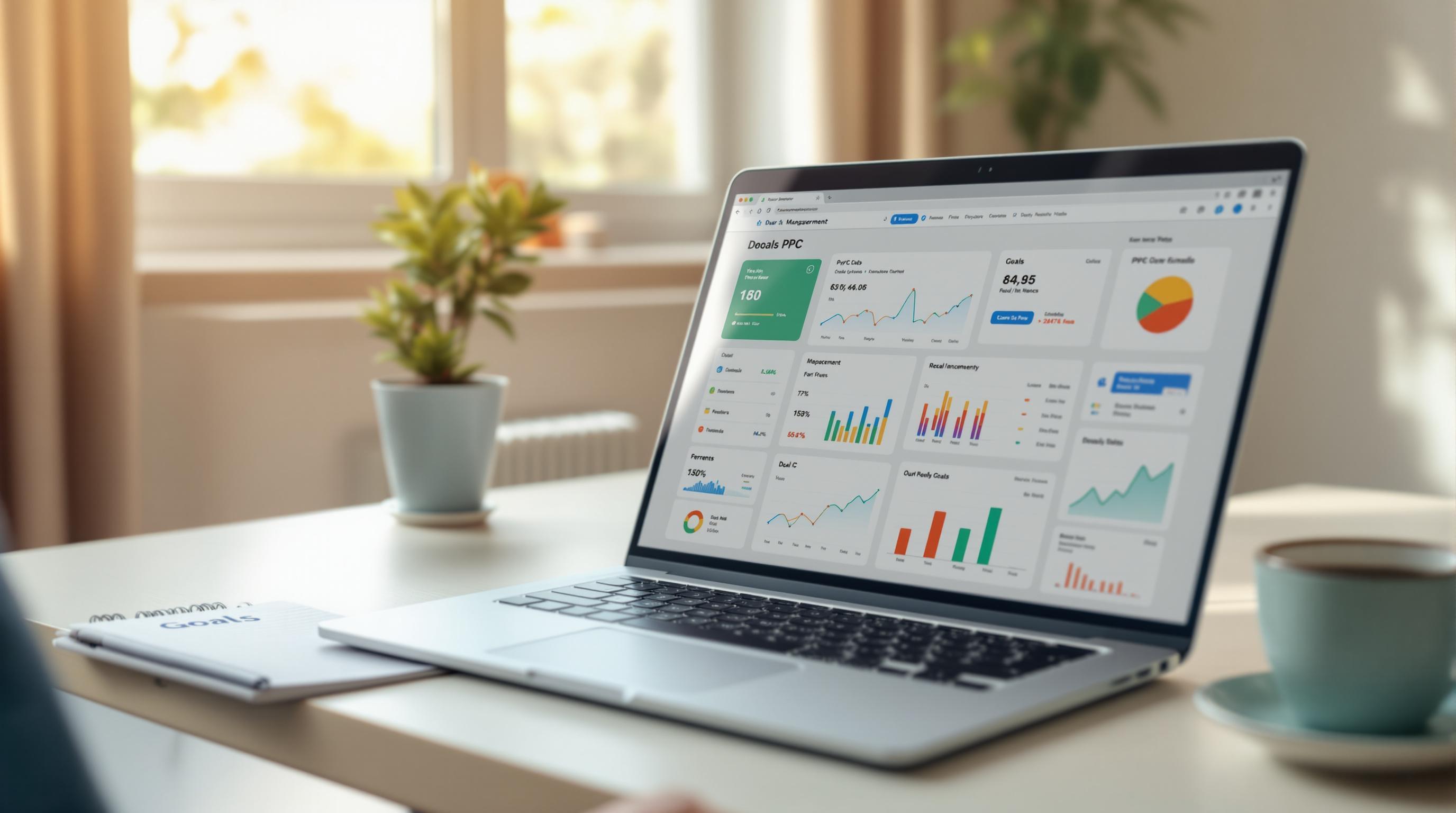Choosing between CPC (Cost Per Click) and CPA (Cost Per Acquisition) depends on your campaign goals and available data. Here's a quick breakdown:
- CPC: Pay for each click on your ad. Best for driving traffic and testing campaigns. Works well with limited data and gives you manual control over bids.
- CPA: Pay for conversions like purchases or sign-ups. Focuses on optimizing ROI using machine learning. Requires stable conversion data to perform effectively.
Quick Comparison
| Feature | CPC Bidding | CPA Bidding |
|---|---|---|
| Primary Focus | Cost per click | Cost per conversion |
| Control Level | Manual bid management | Automated bid optimization |
| Data Requirements | Minimal | Requires conversion history |
| Best For | Traffic generation, testing ads | Conversion-focused campaigns |
| Optimization Speed | Immediate adjustments possible | Needs time for optimization |
Key Takeaway
- Use CPC for traffic, awareness, or campaigns with little data.
- Use CPA for conversion-focused goals with sufficient historical data.
Read on for detailed guidance on when and how to use each strategy effectively.
Manual CPC vs Maximize Conversions: How to Choose the Right Bidding Strategy
Comparing CPC and CPA Bidding
CPC vs CPA: Side-by-Side Comparison
Here's a closer look at the key differences between CPC and CPA bidding strategies:
| Feature | CPC Bidding | CPA Bidding |
|---|---|---|
| Primary Focus | Cost per individual click | Cost per conversion/acquisition |
| Control Level | High manual control over bids | Automated bid management |
| Data Requirements | Minimal data needed | Requires conversion history |
| Best For | Traffic generation, campaign testing | Conversion optimization, ROI focus |
| Budget Management | Direct control over cost per click | Control over cost per conversion |
| Learning Curve | Easier to implement and manage | More complex, involves data analysis |
| Optimization Speed | Immediate adjustments possible | Takes time to optimize effectively |
Now that we’ve laid out the differences, let’s dive into when each strategy makes the most sense.
When Should You Use CPC?
CPC bidding works best when you need direct control over your ad spend. With this method, you manually set maximum bids for clicks, making it a great choice for campaigns that lack robust conversion data or are in the testing phase.
CPC is particularly useful for:
- Building traffic for new markets or products
- Campaigns where conversion data is limited or inconsistent
- Quickly adjusting bids based on real-time performance metrics
If you’re just starting or testing the waters, CPC can help you gather insights without relying heavily on historical data.
When Should You Use CPA?
CPA bidding shines when your focus is on driving conversions at a set cost. This strategy uses algorithms to optimize bids based on factors like device type, location, and user behavior. However, it requires a solid foundation of conversion data to perform effectively.
To get the most out of CPA bidding, ensure you have:
- A stable history of conversions
- Proper conversion tracking in place
- Clear, realistic CPA targets
- A flexible budget to allow for initial learning periods
For additional tips and tools to enhance CPA bidding, check out resources like the Top PPC Marketing Directory (https://ppcmarketinghub.com).
Steps to Pick the Right Bidding Strategy
Define Your Campaign Goals
To choose the best bidding strategy, start by identifying what you want to achieve with your campaign. Your objectives will determine whether CPC or CPA bidding fits your needs.
For traffic-focused campaigns, CPC bidding gives you control over costs and is useful when you need to:
- Test ad copy
- Build awareness
- Gather data for future optimization
For conversion-focused campaigns, CPA bidding works better when you have:
- Clearly defined conversion goals
- Reliable conversion tracking in place
- Enough historical data to guide the system
Once your goals are set, the next step is to evaluate your campaign's current performance to see which strategy makes sense.
Review Your Campaign Data
Before changing bidding strategies, take a close look at your campaign's historical data. Automated bidding strategies, like CPA, depend heavily on the quality and amount of this data.
Here are the key metrics to check:
| Metric | Minimum Threshold | Purpose |
|---|---|---|
| Conversion Volume | 15+ conversions | Ensures CPA bidding can perform well |
| Conversion History | At least 30 days | Provides a stable dataset for automation |
| Cost per Conversion | Current baseline | Helps set realistic CPA targets |
| Click-through Rate | Industry benchmark | Shows how relevant your ads are |
By analyzing these metrics, you’ll be better equipped to decide whether to stick with manual CPC or move to automated CPA.
Start with Manual CPC or Switch to Automated CPA
Manual CPC is a great starting point because it gives you control and helps you gather initial performance data. Use this phase to identify keyword performance, refine quality scores, and understand your budget needs.
Once you’ve collected enough data - at least 15 conversions within 30 days - you can switch to CPA bidding. When transitioning, set a slightly higher initial target CPA to give the system time to adjust and learn [1][2].
sbb-itb-89b8f36
Improving and Monitoring Bidding Performance
Review Performance Regularly
Keeping a close eye on performance is key for both CPC and CPA bidding strategies. Schedule weekly or bi-weekly reviews to assess key metrics and spot areas for improvement:
| Metric | What to Monitor | Action Threshold |
|---|---|---|
| Click-Through Rate (CTR) | Ad relevance and engagement metrics | Update ads if CTR drops 20% below the industry standard |
| Conversion Rate | Campaign effectiveness and ROI | Optimize if deviation exceeds 15% from your target |
| Cost per Conversion | Spending efficiency vs. goals | Reassess if costs go 20% over your target CPA |
| Return on Ad Spend | Overall campaign profitability | Adjust if results fall below the break-even point |
Make small, incremental bid adjustments to accurately gauge the impact of your changes. Once regular reviews are in place, the next step is to use tools that can fine-tune your bidding strategy [3].
Use Tools and Resources
Specialized tools can make monitoring and improving performance much easier. Platforms like the Top PPC Marketing Directory (ppcmarketinghub.com) offer access to a variety of solutions for bid management, including:
- Real-time bid adjustments informed by performance data
- Advanced analytics and reporting features
- Automated A/B testing to refine ads
- Cross-channel bid management to streamline efforts
Once you've chosen the right tools, focus on using the insights they provide to make smarter, data-driven decisions [3][6].
Make Adjustments Based on Data
Improving bidding performance relies heavily on using data effectively. Here's how to approach adjustments:
- Keep track of conversion trends and analyze device performance to identify what works best.
- Modify bids based on performance across different segments, like audience or location.
- Allow enough time for the system to learn and adapt after making changes.
Smart Bidding can be a game-changer, as it uses real-time signals like device type and location to optimize bids for better conversions. While it takes patience to see results, consistent tracking and adjustments will pay off.
"Smart Bidding strategies use real-time signals to optimize for conversions or conversion value, making continuous adjustments to achieve optimal ROI and ROAS" [3][6].
Conclusion: Choosing Between CPC and CPA
Key Takeaways
Deciding between CPC (Cost Per Click) and CPA (Cost Per Acquisition) depends on your campaign goals and the data you have at hand. CPC allows for detailed control over bids and is ideal for driving traffic, while CPA focuses on conversions using automated bidding.
Here’s how they stack up:
- Campaign Goals: CPC is great for increasing traffic and brand visibility, whereas CPA is designed to drive conversions.
- Data Needs: CPC can work with minimal data, but CPA requires a solid history of conversions to perform effectively.
- Control: CPC gives you hands-on control, while CPA relies on automation to optimize bids.
- Timing: CPC can be implemented immediately, but CPA needs a learning phase to gather enough data for optimization.
Platforms like the Top PPC Marketing Directory can help streamline bid management. They offer advanced tools for analytics and automation, making it easier to manage both CPC and CPA campaigns.
It’s essential to keep a close eye on your campaigns. CPA strategies, in particular, can deliver better results over time.
"Target CPA strategies can become more effective over time, offering more value by bringing in qualified leads at a lower cost per conversion, but require an initial learning phase" [4].
To get the most out of your campaigns:
- Use past performance data to guide decisions.
- Keep an eye on key metrics regularly.
- Make small, thoughtful adjustments as needed.
- Match your strategy to your budget and goals.
As your campaign evolves and you gather more performance data, your approach should evolve too. Staying focused on your objectives and using a data-driven mindset can help you achieve better results [3][5].
FAQs
What is the difference between CPC and CPA in target?
CPC (Cost-Per-Click) gives you direct control over bids at the keyword, ad group, or campaign level. On the other hand, Target CPA (Cost-Per-Acquisition) uses machine learning to automate bids and focus on driving conversions.
Here’s a quick breakdown of the key differences:
| Aspect | CPC Bidding | CPA Bidding |
|---|---|---|
| Control Level | Manual bid management | Automated optimization |
| Best For | Driving traffic, brand visibility | Conversion-focused campaigns |
| Optimization | Hands-on, real-time adjustments | Automated via machine learning |
| Strategy Focus | Managing click costs | Reducing conversion costs |
Pro Tip: For CPA bidding, set a max CPC bid limit about 25% higher than your average CPC. This gives the system flexibility to optimize for conversions while staying within a controlled budget [5].
If you’re looking for tools to help manage and optimize either strategy, check out the Top PPC Marketing Directory (https://ppcmarketinghub.com). These tools can provide insights to improve campaign performance and control costs.


